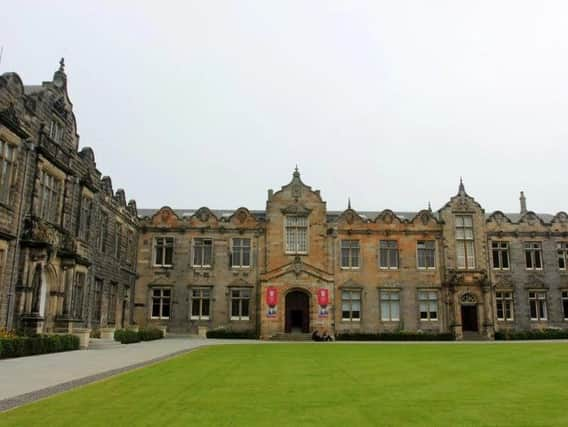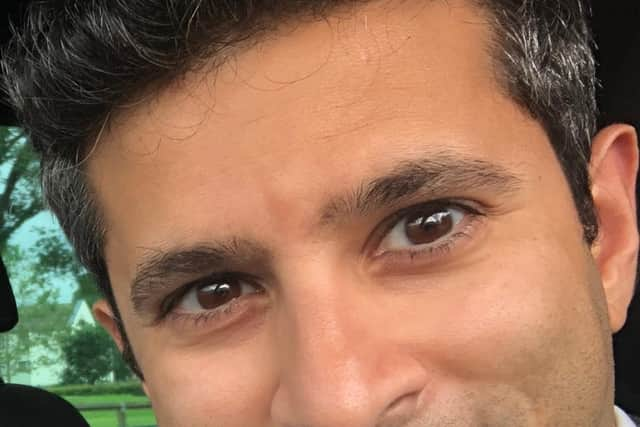St Andrews: The historic law that barred Scotland's oldest university from awarding medical degrees


But now, a change in law is set to reverse a ruling which stemmed from a rift between the two institutions which left St Andrews – Scotland’s oldest university - unable to award full medical degrees to students.
Instead, since 1966, the university has awarded medics a degree in medical science - and sent them to training centres in cities such as Manchester to study the clinical part of their course.
Advertisement
Hide AdAdvertisement
Hide AdA Scottish Parliament committee has called for evidence over changing a law which will give St Andrews the right to award full medical and dentistry degrees from 2022.


The University of St. Andrews (Degrees in Medicine and Dentistry) Bill would remove a legal prohibition that currently prevents the University from granting medical degrees by repealing a section of the Universities (Scotland) Act 1966.
If passed, the Bill would be the first step in allowing the university to award the qualification to Scottish Graduate Entry Medicine (ScottGEM) students, who are set to graduate in 2022 in a four-year graduate entry medicine programme run by the universities of St Andrews and Dundee.
The General Medical Council will still need to approve the university to grant degrees in medicine and removal of the legal prohibition will not automatically result in the University’s ability to award other medical and dentistry degrees.
Speaking as the call for views was launched, Health and Sport Committee Convener, Lewis Macdonald MSP, said: “St Andrews is the oldest university in the country and, due to historic reasons, the only ancient university not to award medical and dental degrees.
“This Bill looks to revisit this matter and, if passed, would be the first step in allowing the university to award such degrees for the first time since 1966.
“The Committee wants to hear from a range of stakeholders including universities, regulatory bodies, medical organisations and students. We look forward to hearing both the case for making this change but also any concerns which may exist in the wider context of the provision of medical and dental education in Scotland.”
Senior doctors who studied at St Andrews but completed their degree at the University of Manchester, believe that the move could attract more Scottish medics to the university.
Advertisement
Hide AdAdvertisement
Hide AdPeter Taylor studied at St Andrews from 1998, before completing his studies in Manchester, at the city’s Manchester Royal Infirmary. He is now a clinical senior lecturer, consultant and endocrinologist in Cardiff.
He said: “It could make St Andrews a more attractive destination for Scottish students studying medicine. The majority of people at medical school end up, long-term, working where they qualify, so Scots who ultimately want to stay in Scotland could have been put off the course before. St Andrews students did half their medical degree in Scotland, but I wouldn’t think that Scotland would have ended up with half the doctors.
“The courses have become increasingly divergent over the years. St Andrews was very academic and lecture-based when I was there, while Manchester has moved to problem-based learning.”
He added: “It will be interesting to see where students are sent to study - the hospitals at Kirkcaldy and Dunfermline are very good, but small and couldn’t support a whole cohort of students to train and Dundee has its own students.”
The rift began when, in 1881, Miss Mary Ann Baxter and her cousin, John Boyd Baxter - two of the famous Baxter family, who made their money from the Jute mills of the city - donated £140,000 to the creation of a college in Dundee.
Eight years later, however, power was given to commissioners to affiliate University College Dundee and make it part of St Andrews. Medical students had a choice of completing the first half of their studies at either university, and this relationship continued until the 1960s.
The Universities (Scotland) Act 1966 removed the ability of St Andrew’s University to grant degrees in medicine and dentistry. This was because the act made Dundee and St Andrews entirely separate universities. As a result, because the clinical part of the medical school had been based in Dundee, St Andrews had no clinical medical school or teaching hospital and the university lost its right to award MBChB1 medical degrees.
Bilal Kirmani, a consultant cardiac surgeon in Liverpool, who studied at St Andrews in the late 1990s, said: “There was certainly a lot of praise from the clinical educators at Manchester for St Andrews students’ general scientific knowledge, because of the way the course was taught – the understanding basic scientific knowledge was always considered excellent.
Advertisement
Hide AdAdvertisement
Hide Ad"Then students had the chance to have their clinical experience at one of the largest medical schools in Europe.”
He added: “For me, I probably would have preferred to stay in St Andrews, as I liked the small town feel, but I think the split course did give us an advantage.”
A message from the Editor:
Thank you for reading this story on our website. While I have your attention, I also have an important request to make of you.
The dramatic events of 2020 are having a major impact on many of our advertisers - and consequently the revenue we receive. We are now more reliant than ever on you taking out a digital subscription to support our journalism.
Subscribe to scotsman.com and enjoy unlimited access to Scottish news and information online and on our app. Visit https://www.scotsman.com/subscriptions now to sign up.
By supporting us, we are able to support you in providing trusted, fact-checked content for this website.
Joy Yates
Editorial Director